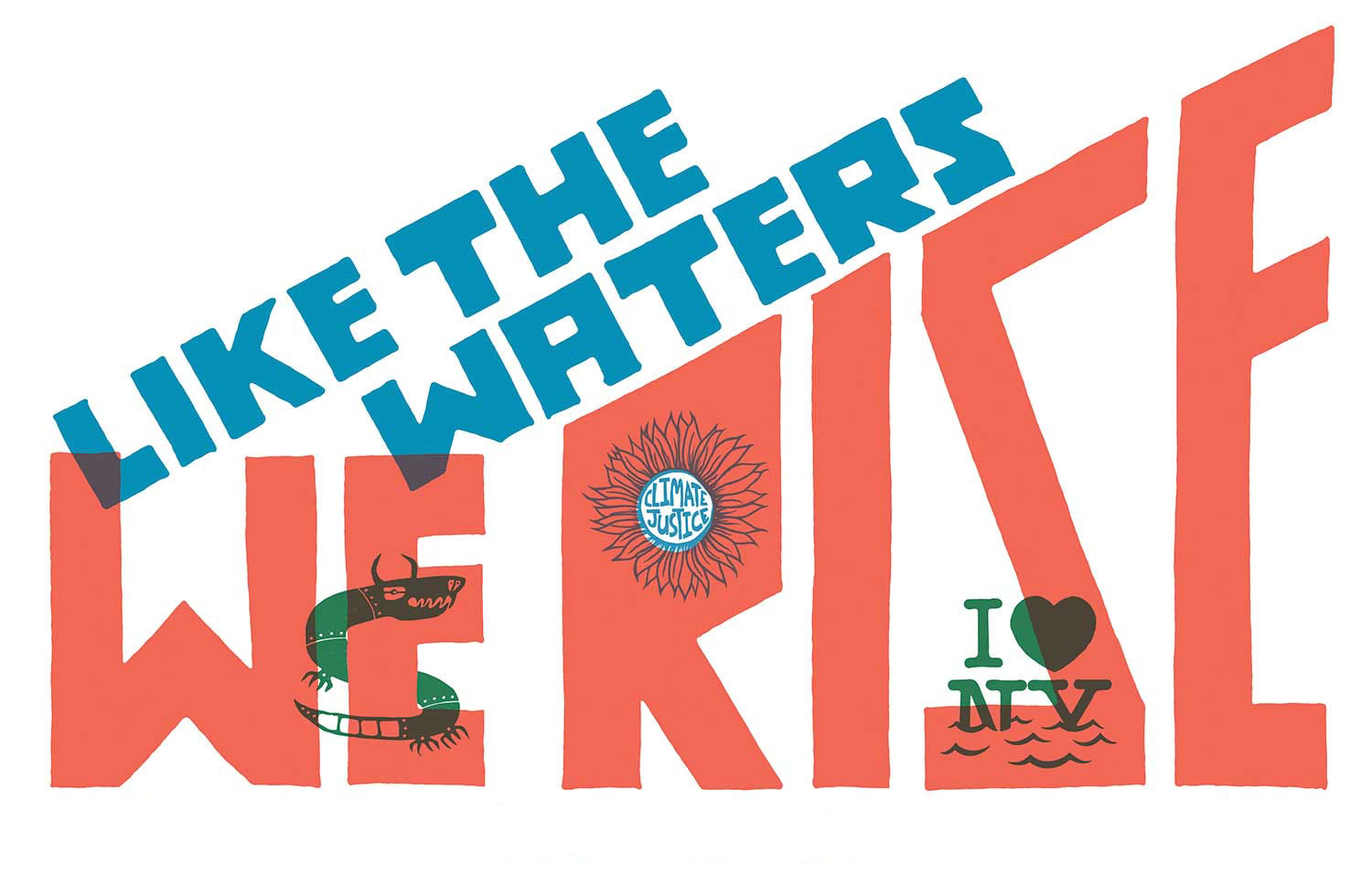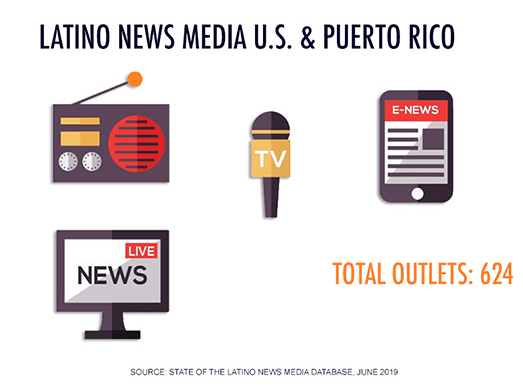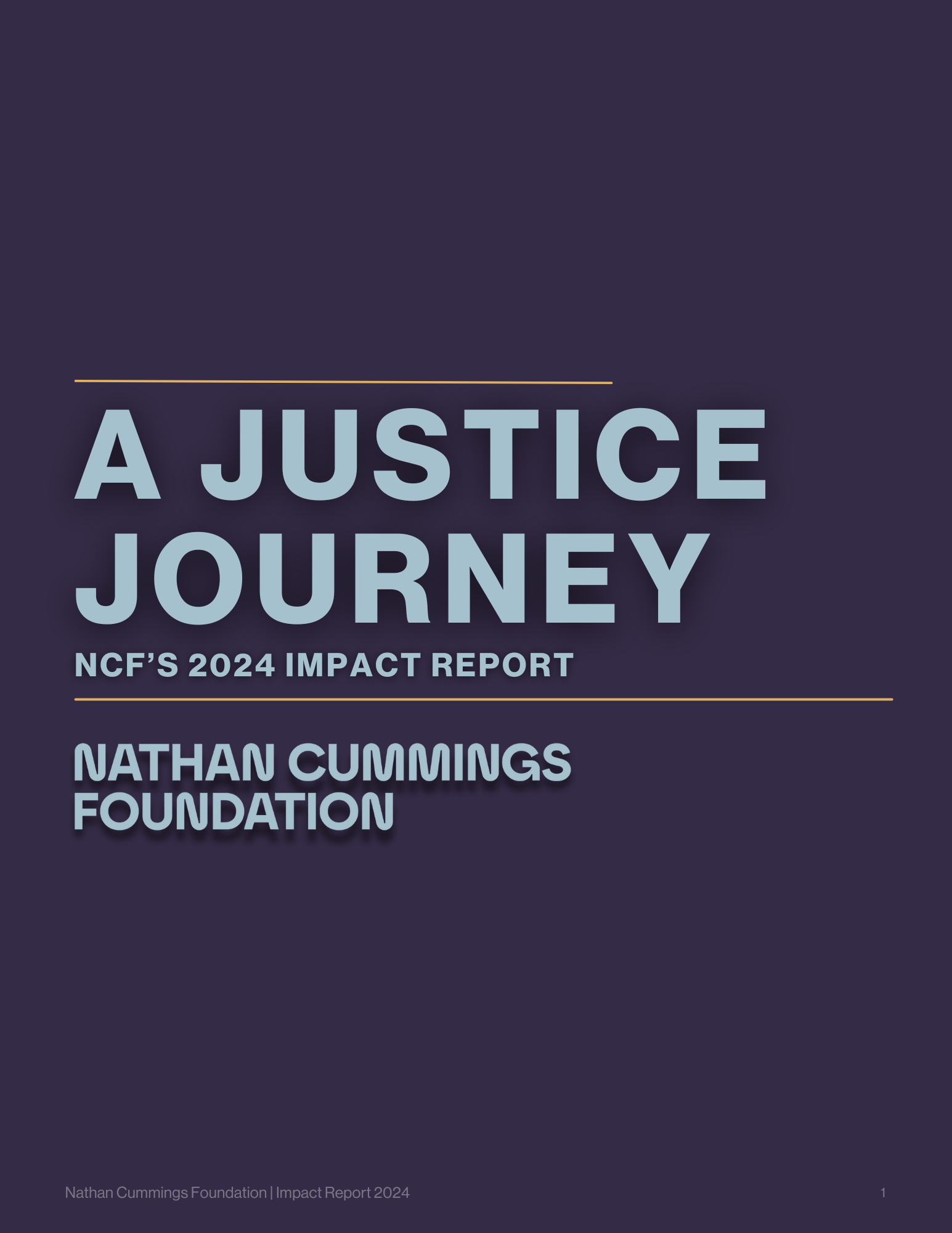A vast movement for climate justice continues to rise worldwide, directly challenging the powerful interests of those most responsible for the climate crisis, while working towards building a just and equitable response that ensures the health, safety and dignity of all people. At its center, the climate justice movement is driven by an understanding that economic and racial disparities result in unequal, unjust impacts—impacts which are already being felt in communities across the country. Just as importantly, many of the solutions we will need are emerging from these very communities on the frontlines.
Like the Waters, We Rise: Climate Justice in Print opens at the Nathan Cummings Foundation on Thursday, November 21, launching a celebration of the bold, graphic work of print-based artists who are on the frontlines of our Climate Justice movement.
Artists have long been at the heart of this movement, finding bold, inspiring ways to help uplift struggles, reveal connections between climate and intersecting issues, build public support, and paint a picture of the world we are working to create. Like the Waters, We Rise tells the story of this expansive climate justice movement through a collection of print-based works developed as part of—or inspired by—occupations, direct actions, and mass mobilizations. Taken together, these works show the many terrains of struggle, points of intervention, and solutions of this continually expanding movement of movements.
Like the Waters, We Rise is developed in collaboration with Interference Archive, an all-volunteer “archive from below” located in Brooklyn. For the last eight years Interference has dedicated itself to carefully collecting, documenting, and preserving the cultural work of social struggles throughout the past several decades.
The exhibit takes place in two parts. The first opens at the Nathan Cummings Foundation, and includes a selection of recent print based work (2005-present) beginning the year that Hurricane Katrina crashed onto the shores of the Gulf Coast. The second opens at Interference Archive in February 2020, and will include a collection of archival prints documenting the historical legacies of movements that gave birth to the current climate justice movement, including the Indigenous sovereignty movement, the farmworker movement, Black liberation struggles, and more.
The work shown within these exhibitions provides a partial look at a continually growing body of work, one that shows the growing strength and reach of the climate justice movement, a movement through which so many of our issues, struggles, and communities are connected.
This project was organized by Raquel de Anda (lead curator) and Nora Almeida, Ryan Buckley, Sophie Glidden Lyon, Josh MacPhee, and Siyona Ravi.
Participating artists include: AgitArte, Nikila Badua, Bemba PR, Rae Breaux, Mona Caron, Hannah Chalew, Onaman Collective, Kate DeCiccio, Alec Dunn, Design Action Group, Dignidad Rebelde, Extinction Rebellion, Juan R Fuentes, Gan Golan, Lacy Hale, Aaron Hughes, Jakarundi Graphics, LMNOP, Louisiana Bucket Brigade, Nicolas Lampert, Cesar Maxit, Saiya Miller, Dylan Miner, Sunrise Movement, The Natural History Museum, Peter Pa, Paperhand Puppet Intervention, Sadie Red Wing, David Solnit, Chip Thomas, Rommy Torrico, Jessica Sabogal, Rachel Schragis, Jess X Snow, Meredith Stern, Eleanor Warner, Josiah Werning, Ernesto Yerena, Bec Young.
Please join us for an opening reception on Thursday, November 21 from 6:00 – 8:30 p.m. at the Nathan Cummings Foundation. RSVP via Eventbrite is required to attend as space is limited. Guests are first come, first served.
To set up an appointment to visit the exhibition Monday-Friday 10:00 a.m – 5:00 p.m., please contact exhibits@nathancummings.org.
+++
Raquel de Anda is an independent curator and cultural producer based in Brooklyn, NY. De Anda began her career as Associate Curator at Galería de la Raza, a contemporary Latino arts organization in San Francisco, CA (2003-2010). Her work spans a variety of practices, including producing trans-media film based projects, organizing public interventions and mass mobilizations and curating exhibitions at museums, galleries and alternative arts spaces across the country.
Rooted in the Jewish tradition of social justice, the Nathan Cummings Foundation works to create a more just, vibrant, sustainable and democratic society. The Foundation focuses on finding solutions to the two most challenging problems of our time – the climate crisis and growing inequality – and aims to transform the systems and mindsets that hinder progress toward a more sustainable and equitable future for all people, particularly women and people of color.
Interference Archive is a library and social space run entirely by volunteers in Gowanus, Brooklyn. Its mission is to explore the relationship between cultural production and social movements. This work manifests in an open-stacks archival collection, publications, a study center, and public programs including exhibitions, workshops, educational visits, talks, and screenings, all of which encourage critical and creative engagement with the rich history of how people have organized to transform and improve their lives.
For the past year, Claudia Horwitz, Shifra Bronznick, and I have been working together to discern how the Nathan Cummings Foundation can continue to strengthen Jewish movements for justice for the long-haul at a time of racial injustice, growing antisemitism, assaults on democracy, and growing global authoritarianism.
The exploration is part of a larger body of work in the Voice, Creativity, and Culture portfolio that includes building the power and capacity of multifaith movements for justice to shift dominant narratives about race, class, gender, and ethnicity and building the solidarity and empathy necessary for a multiracial, democratic society.
We are writing to update you on our progress and let you know about a significant investment the Nathan Cummings Foundation is making to deepen the internal and spiritual capacities of Jewish justice leaders.
We heard from many of you that, in order for the US Jewish community to more directly lend our collective power to the birthing of a multiethnic democratic society in America, the Nathan Cummings Foundation — in addition to our funding for the Jewish justice movement ecology — should explore long-term, capacity building investments (like the foundation did fifteen years ago with the Selah Leadership Initiative) in the internal and spiritual capacity of Jewish leaders engaged in pursuing justice.
We heard a clear, collective hunger to steep movement work in the Jewish tradition’s rich lineage of sacred text, prophetic teachings, ritual, and song.
We heard a call to support Jewish justice leaders in deepening their analyses on antisemitism, racism, economic inequality, and other forms of oppression, and the ways they feed on one another.
We heard a need to help Jewish organizers better understand their relationship to non-Jewish communities and for catalytic investments in the leadership of Jews of Color, LGBTQ Jews, working-class Jews, and other Jews more likely to be on the margins. We heard that a range of experiments are already underway to make this well of resources more accessible and impactful for more people in our community and our movement.
Responding to these needs, the Board of the Nathan Cummings Foundation approved an initial $900,000, two-year grant to the Rise Up Initiative, which will fund, coach, and convene a range of initiatives that strengthen the internal and spiritual capacity of the Jewish community to lend its power to intersectional movements for justice.
The Rise Up Initiative will focus on funding and supporting experimental initiatives at the intersection of transformative leadership rooted in Jewish tradition and justice movements, helping to amplify and synthesize their fruit. Shining and mirroring this work out to a larger circle will scale up impact on individuals, organizations, institutions, and existing networks. Ultimately, we hope this work will equip Jewish justice leaders with internal capacities to boldly lead in helping to birth a multiracial democracy in America.
The Rise Up Initiative’s strategies will be:
- Grantmaking to spur innovation, with a focus on experimental work that has seen early success and/or the potential to transform both social justice institutions and movement building. Limited rapid response funds are also available.
- Offer tailored leadership and organizational assistance through coaching, training, consulting, and mentorship. This is designed to help leaders manage adaptive challenges, and cultivate shared leadership, deeper listening, and strong strategy.
- Convene “bright nodes” of work to deepen relationships, cross-pollinate capacities, and integrate wisdom. Recognizing the energy it takes to bring people together, we will make creative use of available virtual modalities for connection to both build toward and sustain follow up from in-person convenings.
- Capture and share stories and strong practice through participatory research and multi-media dissemination. We want to help folks create innovative ways to document and share their work through a range of mediums.
- Lay groundwork for a Radical Yeshivah, an exciting idea that emerged during the interviews and has the potential to respond to many of the aspirations named by practitioners. A diverse group will take this ancient form, and lessons from current exciting iterations, and design an approach that embodies the social justice movement in form, content, and spirit.
The Rise Up Initiative will be staffed by Claudia Horwitz and fiscally sponsored by the Social Good Fund. Regular update calls and communications will provide opportunities for ongoing feedback and updates on the initiative. We hope over time to attract additional funding partners to grow The Rise Up Initiative’s potential for impact and capacity for grantmaking.
The Rise Up Initiative will continue to work with key partners that helped immeasurably during our strategy development.
- Inside Out Wisdom and Action Project, led by Rabbi David Jaffe and Dan Gelbtuch, builds capacity of Jewish social justice activists through classical Jewish spiritual practices (Chasidut and Musar) to turn burnout and despair into creativity and resilience.
- Jewish Women of Color Resilience Circle, led by Yavilah McCoy, supports Jewish women leaders of color through a transformational leadership development practice that links activism, relationship building, spirituality, and self-care.
- Taproot, led by Rabbis Irwin Keller, Diane Elliott, and Eli Herb and organizers Adam Horowitz, Rachel Plattus, and David Bronstein, supports an immersive, week-long gathering of intergenerational Jewish study and experience for a diverse group of activists, artists, and changemakers to tap into their Jewish background for resilience strategies and wisdom in the Bay Area.
- Reconstructing Judaism’s Reset Initiative, led by Jessica Rosenberg, supports Jewish justice organizations to develop approaches of combining spiritual and other resilience practices to transform and invigorate organizational culture.
It has been a sincere pleasure to speak with so many of you about this project, and we welcome your thoughts and questions. If you are interested in learning more about the work as it evolves or how to get involved, click here to sign up for updates.
Via Confluence Philanthropy : “Many foundations are committed to social justice – yet they continue to rely on a “business-as-usual” approach in their investment practices. Maintaining the status quo is often counterproductive as it produces some of the same barriers that mission-focused organizations are attempting to tackle through grantmaking.”
The Nathan Cummings Foundation’s Director of Corporate and Political Accountability, Laura Campos, recently sat down with leaders from three of our partners – Joe Maxwell, Executive Director of the Organization for Competitive Markets (OCM), Sarah Miller, Deputy Director of the Open Markets Institute (OMI) and Stacy Mitchell, Co-Director of the Institute for Local Self-Reliance (ILSR) – all of whom are on the frontlines of the fight to decrease concentrated corporate power. Each shared their take on how addressing unfettered corporate power can help us create a more just and inclusive economy.
Below is part two of NCF’s two-part series, “Corporations Shouldn’t Have a Monopoly on Power.” You can read the first installment here.
Laura: Why is it so crucial that anti-monopoly work incorporate a racial justice analysis? How does concentrated corporate power exacerbate racial injustice?
Stacy: When industries consolidate, businesses owned by people of color are shut out of markets. Local ownership is a significant way to build wealth and create enterprises that are embedded in and accountable to their communities. As concentrated power has grown, opportunities for entrepreneurs of color to succeed and grow has been constrained and often just shut down completely.
For a forthcoming report, ILSR mapped the distribution of community banks by county between 2006 and 2018 and the level of consolidation is dramatic. Nationally, more than 40 percent of all local banks disappeared in this 12-year period. We also looked at this shift through a lens of race and, particularly in black communities, there has been a disproportionate loss of local banks. This has led to a decline in lending. The whole engine of how you build a local economy that works for people is just missing if you don’t have the financial piece.
Monopoly power also has significant implications for our ability to create an inclusive clean economy. New energy technologies like distributed solar are so much more economical than coal plants and nuclear and even natural gas in most states. So, the old centralized monopoly utility model doesn’t make sense anymore, but the old monopolies are trying very hard to hold on to their position. They want to keep operating their fossil fuel plants, but there are legislative campaigns underway in many states to support distributed ownership. If you bring a racial and economic justice analysis into how you design these policies, it changes how you structure the rules — for example, what the financing mechanisms should be — so that everybody can participate in being a producer and an owner of power.
We’re beginning to see coalitions that bring together workers, small businesses, farmers, and communities of color because there’s a growing realization that racism, concentrated economic power, and the fraying of democracy are connected, and that we can only fix these interlinked problems through structural change. This is a potentially transformational shift in our politics. We’re starting to see the kind of coalition that could drive significant change.
Sarah: Open Markets’ intent is to create an economy that is more inclusive, where people are more financially secure and there are broader opportunities for people to succeed and start their own businesses. But we’re trying to push all these things up a really steep incline because we’ve allowed our markets to be structured so that wealth and power are going straight up instead of flowing towards the bottom of the income ladder and disproportionally harms communities that have been historically excluded from power.
Laura: How can antitrust and anti-monopoly level the playing field to address inequality?
Sarah: Antitrust and anti-monopoly give us the tools to change the incline. If we start to think about market structure along these broader lines, and not just through the consumer welfare standard and other corrupt economic models, we will be able to accelerate progress on these other areas. Both because it will be easier to achieve politically and because our markets will be structured so that those outcomes are more easily achieved. Right now, it is difficult to achieve goals like a more equitable, inclusive economy, because you have a narrow group of corporate elites who are able to dump money right through our political system and corrupt priorities from the inside, causing progress on racial and economic justice to be even more distant.
We are in the middle of a national conversation about power. Who has power and who should have power? The job of Open Markets and others is to put concentrated corporate power at the center of this conversation because it’s a big reason why communities have been disempowered and families are struggling. We’re seeing a narrative play out that is harnessing racism quite explicitly to fuel a political movement and creating a politics of grievance around black and brown people and immigrants. But really, the reason why so many communities are struggling to get ahead is not because of those factors, but because we have this deeply broken economic structure characterized by concentrated corporate power in which a small set of monopolists continues to expand power for themselves and shut it off for others.
Joe: One of the encouraging things about the current moment and the push around anti-monopoly is that we’re looking at structural problems in the economy. For a long time, we inhabited this ideology that assumed that the economy was happening in the same way the weather happens, and it was natural forces that were driving concentration and many of the problems we’re seeing.
Now we’re seeing the economy much more as a result of deliberate policy decisions about how we structure the economy. We’ve structured the economy in a way that consolidates of power. And it’s essential to recognize that the extraction of wealth and destabilization of communities, particularly African American communities and other communities of color, is a feature of how our economy is set up to work and not a bug. And so, work around anti-monopoly and racialized capitalism has come together and resulted in a broader realization that changing the rules that govern the economy is key to solving some of these problems and their disproportionate impact on communities of color. And I think that is a healthy turn in the political conversation.
The rise of giant platform monopolies like Facebook, Google and Amazon has drawn renewed attention to the problematic nature of concentrated corporate power. The unfettered power of these and other massive corporations is inextricably linked to the failure to decrease inequality, promote racial justice and address the climate crisis, and anti-monopoly work is a key ingredient in the fight to achieve durable progress on these critical issues.
The Nathan Cummings Foundation’s Director of Corporate and Political Accountability, Laura Campos, recently sat down with leaders from three of our partners – Joe Maxwell, Executive Director of the Organization for Competitive Markets (OCM), Sarah Miller, Deputy Director of the Open Markets Institute (OMI) and Stacy Mitchell, Co-Director of the Institute for Local Self-Reliance (ILSR) – all of whom are on the frontlines of the fight to decrease concentrated corporate power. Each shared their take on why antimonopoly work is attracting so much attention.
Below is part one of NCF’s two-part series, “Corporations Shouldn’t Have a Monopoly on Power.”
Laura Campos: What’s driving the renewed focus on concentrated corporate power?
Stacy Mitchell: One factor is that there’s a growing recognition that the persistent structural problems we’re seeing in the U.S. economy are, at least in part, an outgrowth of concentration. For instance, we have low unemployment and yet people’s incomes are not going up. They’re totally stagnant. That’s been a puzzle for economists. But once they began to look at the effects of concentration, this puzzling dynamic suddenly made sense. In fact, concentrated corporate power explains a lot of the challenges we’re facing.
The public gets this issue as well. People across the country see that, increasingly, control over what happens in their local community rests with far away corporations. Whether you’re talking about urban places or rural places, red states or blue states, concerns about corporate control really resonate.
Sarah Miller: The scandals surrounding Facebook helped change the debate around concentration and monopoly power. For the first time in recent memory, we have a protagonist in the story about how and why monopoly power is so dangerous. Open Markets has harnessed this to reframe a lot of the problems plaguing our economy and our democracy, whether it pertains to workers, prices, regional inequality or political inclusion.
Joe Maxwell: Some of the change is attributable to the conversations driven by the 2016 elections and the fact that both parties began to talk about the role that large corporations play in the continuance of a system where the deck is stacked against most people. The Republican base is just as leery of big as the Democratic base and that’s opened up the opportunity for bipartisan work. Policymakers are beginning to take a hard look at competition policy and antitrust work. We’re very optimistic that now’s the time to move.
Laura: How does consolidation harm workers and exacerbate inequality?
Sarah: When corporations have more power and fewer competitors, they’re able to exploit it to drive up prices and hold down wages. A study that came out a few years ago found that if levels of concentration across the economy were the same as they were in the early 1980s—so much less concentrated—your average worker would be making $14,000 more a year. That’s a lot of money. Other studies have also found that the massive amounts of competition among workers and very low levels of competition among employers have a very significant impact on income.
Stacy: There are only a few companies competing for workers. So, if you’re a nurse or you repair farm equipment, chances are, in your region, there may be one or maybe two employers. And that means the companies have extraordinary power to hold down wages.
Joe: An Oxfam investigation found that some poultry processing workers had to wear diapers because their employer would not give them bathroom breaks. People say, “Well, why don’t they go get a different job?” What needs to be understood is there’s not a different job.
Stacy: This impacts wages throughout the supply chain too. A recent study by Nathan Wilmers of MIT’s Sloan School of Management found that manufacturers that sell into more concentrated markets pay their workers lower wages. For example, think of a food company selling to Walmart and the other dominant grocery chains, and how it’s constantly being squeezed by these big buyers.
Historically, depending on your occupation, you could potentially go out and start your own business but that’s become much harder as dominant corporations rig markets. We’re now creating new businesses at about one-third the rate that we were in 1980. If forming a union was one path to the middle class, starting a small business was another. Today, both paths have been blocked by corporate power.
Joe: We’ve unbridled capitalism and allowed for market share to be gained by a handful of very powerful companies. They’re able to squeeze all the profits out of that market and put them in their pocket. For instance, 71% of contract poultry growers live at or below the federal poverty level and yet Tyson is recording record profits each quarter. That money isn’t just extracted out of the farmer’s pocket but out of rural communities. We have seen small processing plants and small distributors driven out of business and seed corn companies put out of business by Monsanto. We’ve lost the wealth and infrastructure that those small businesses have supplied, and it has just devastated rural America.
Save the date: On Sept. 10, at 12:30 PM ET, NCF’s Bob Bancroft joins W.K. Kellogg Foundation’s Cynthia Muller to explore Confluence Philanthropy’s new report (buff.ly/2YvUr3G) and how foundations are using a racial equity lens in impact investing. Register now: https://buff.ly/2NrbFse
Via Impact Alpha: The Business Roundtable’s statement from 181 CEOs committed to pay employees fairly, protect the environment and foster diversity and inclusion. They also committed to transparency and effective engagement with shareholders. The statement confirmed that the purpose of a corporation extends beyond simply generating profits for its shareholders.
And yet, the Roundtable and its members are part of a worrisome push to restrict shareholders’ ability to prompt effective engagement on these very same issues.
Read more: Impact Alpha.
Confluence Philanthropy released a new report today that offers a strong call to action to advance racial equity in the investment industry. The report, “It’s About Time: A Call to Advance Racial Equity in the Investment Industry,” is the result of a year-long listening tour and research effort.
Executive Director of Pop Culture Collaborative and 2015 Nathan Cummings Foundation Fellow Bridgit Antoinette Evans sat down with our first fourth-generation Chair of the Board of Trustees Jaimie Mayer for a wide-ranging conversation about next generation leadership, building a culture of accountability in philanthropy and the power of narrative change. These are the edited excerpts from their talk.
I was so excited to hear the news. What does this mean for you and for NCF?
On a personal level, I’ve worked toward this for as long as I can remember. I’ve served on the board of NCF for 18 years, and have gained experience in the field running nonprofits and consulting next generation philanthropists. I was always inspired by my grandmother and my father’s leadership, so it’s especially meaningful to lead the foundation forward in their memory.
It’s also an important milestone because NCF is deeply committed to next generation leadership. I’m proud to say the fourth generation is more engaged now than ever. But it’s important to clarify that we’re an intergenerational foundation. And just because we have our first fourth-generation Chair doesn’t mean we won’t have another third-generation Chair. We believe there is great value in working shoulder to shoulder, with different generations learning from one another, as we grapple with what it means to be a social justice funder in the world today.
What do you hope other foundations, particularly multigenerational family foundations, take away from NCF’s commitment to next generation leadership?
I hope our actions motivate other family foundations to be champions for next generation leaders. If you don’t let the next generation in, then the legacy of the organization and its founder won’t have the same longevity, and by the same token, the work won’t evolve. Each generation has different passions, insights and views on the world. I can’t urge other foundations enough to let the next generation learn from those around the table, rather than thinking of it as passing the torch from generation to generation. The next generation shouldn’t be seen as threat; it should represent the future.
You’ve grown up with the foundation. How has this shaped your thinking and how you will bring this perspective to your role as chair?
I grew up around philanthropy and NCF. My great-grandfather Nathan Cummings passed away when I was two, and NCF was created posthumously, so there has never really been a time in my life that hasn’t involved the foundation in some way. I got to know my cousins through our involvement at the foundation. We’ve had a working relationship from the beginning, which has proven to be an invaluable asset. For the past 18 years, I have honed my skills, taking every opportunity to learn from family members, independent trustees and staff about how to best use our valuable resources to pursue justice for people and the planet. Having that type of a deep dive into the history and vision of the organization is rare and I’m excited to bring that to the table.
You have an extensive background in the arts, particularly in theater and film. How does your experience as a professional artist and arts leader translate into NCF’s investment in the intersection of arts and social justice?
As a theatre and film producer, I have spent my life and career firmly believing that culture change proceeds policy change, and in the power of arts and culture to shift societal narratives. After all, narratives play such a huge role in how we make sense of the world and how we make sense of each other. They shape the rules and guidelines of our society, dictating which problems are addressed and which solutions are on the table for consideration. And they expand our collective imagination of what is possible. NCF is a longstanding arts and social justice funder.
But through the years there’s been a shift in thinking on arts and culture as not only a vital piece of society, but also a vital strategy to change hearts and minds on the issues we’re advancing. We’re looking at how narrative shows up not only in our voice, creativity and culture portfolio but in all our focus areas as well as our shareholder activism work. While I find all the work at NCF critical at this moment in time, the through line of funding narrative change across our portfolios is particularly exciting to me.
At the Pop Culture Collaborative, we believe philanthropy has a responsibility to build a field that is capable of shaping popular culture to reflect the complexity of the American people and make a just and pluralistic future feel real, desirable and inevitable. A very ambitious set of goals, I will admit. How do you and NCF view the role of the pop culture field in seeding a new narrative environment?
For starters, we’re so proud to be a founding supporter of an organization like The Pop Culture Collaborative. The Collaborative’s formation is a critical leap forward in advancing the combined power of the entertainment, philanthropic and social justice sectors to use pop culture strategies to create transformative change. Plus, it’s a huge resource for philanthropy to better understand this space as a core strategic area for investment. It’s making way for things like cross-sector convenings and relationship-building, funder learning and partnerships, and the commissioning of new research and insights.
In terms of philanthropy’s role, there’s still a big shift that needs to happen in its understanding of culture as a strategy to advance our values. I view the arts as a process, not as a one-and-done product. That means its impact takes time – and can be challenging to measure. Philanthropy needs to be willing to invest in long-term narrative building and increase its risk appetite for this type of funding. If you’re not comfortable going into unchartered territory that doesn’t have all the metrics and measurements of success packaged and tied with a pretty bow, then you’re certainly not going to move the needle. And that’s one of the things I’m most proud of NCF for consistently doing.
If you could wave a magic wand and anything was possible, what do you hope for NCF and the broader field of philanthropy under your leadership?
For me, it’s really about walking the talk. My hope is for NCF and philanthropy writ large to build a strong culture of internal accountability. We hold grantees, movement leaders, companies and organizations to such a high level of accountability and we need to do the same for ourselves. We also need to look at how to deepen the relationship with our grantees, acting as thought partners as opposed to being another hindrance toward their goals. Having run nonprofits throughout my career, I have such empathy for organizations who seek funding. I’ve seen firsthand how many hoops and obstacles they must jump through. All of this means looking closely at our internal infrastructures and systems. Right now, NCF is in the middle of organizational development work to explore new ways of working so we can better serve our grantee partners and advance our mission.
Finally, we need to raise the bar for success in the philanthropic sector. We have to do better. At our board retreat last month, I pushed the board to stop thinking about how we’re doing compared to the world of philanthropy and instead think about how the world of philanthropy is doing compared to what we need it to do to build a more just and equitable world. As much as I wish I did, I don’t have a magic wand, and this is not something that can happen under my short, three-year tenure. It’s a new way of thinking. It’s the long game. But I am excited and energized to keep working toward this new vision with our President Sharon Alpert, board, staff, peers and partners by my side.
Via SSIReview: “And Sharon Alpert, president and CEO of the Nathan Cummings Foundation, noted a related challenge: ‘When you have collaboratives, you essentially create gatekeepers. You don’t have as many one-to-one relationships between funders and grantees.’”
Read more: Stanford Social Innovation Review
“It’s 2019 and we are in the middle of a renaissance in black artistic production. And you are telling me the best people to evaluate that are the same ones who basically ignored black artists for decades?” the art critic Antwaun Sargent tweeted in May.
He was referring to reviews of this year’s Whitney Biennial, which will close in late September. But he could have been writing about reviews of film, theater, dance, even hip-hop.
The curators were a black woman and a white woman, and a majority of the artists they featured were people of color. Half were women; many were young.
But in major media outlets, white critics wrote the reviews that defined the conversation about the country’s pre-eminent contemporary art show. But not without resistance.
Read more: The New York Times.
Via Inside Philanthropy: “Nathan Cummings has a fourth-generation chair of its board of trustees, as Jaimie Mayer, great-granddaughter of the founder, takes over from Ruth Cummings.”
Click here to read a new report titled ‘The State of the Latino News Media’, developed by our partners at the Craig Newmark Graduate School of Journalism at the City University of New York.











